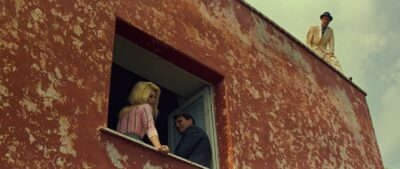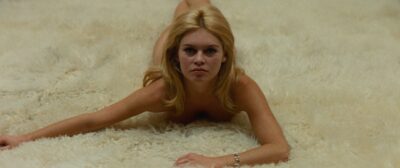Rialto Pictures’ new 60th anniversary restoration of Jean-Luc Godard’s Contempt (1963), the director’s look at a crumbling marriage stars Brigitte Bardot, Michel Piccoli, Jack Palance, and, as a veteran European director, Fritz Lang. “One of the masterworks of modern cinema, a singular viewing experience… a seductive bouquite of enchantments… a many-layered odyssey of intelligence and sensuality.” (Phillip Lopate, New York Times) “Bardot + Godard = Movie Greatness.” (Time Out New York)
Contempt: That’s what ex-typist Brigitte Bardot has for husband playwright/screenwriter Michel Piccoli—but why? Does she think he used her to get that lucrative assignment (to rewrite an adaptation of The Odyssey) from overbearing American producer Jack Palance (“I like gods. I know exactly how they feel.”)? Was it that (innocent) fanny pat to multilingual interpreter Giorgia Moll? Or does she just “not love him anymore?” New Wave wild man Godard, given international stars, a best-selling novel by Alberto Moravia, two high-maintenance producers (Joseph E. Levine and Carlo Ponti), and the biggest budget of his career, still succeeded, as usual, in overturning the conventions of mainstream filmmaking, while producing a meditation on post-Hollywood filmmaking; the pitfalls of international productions; CinemaScope (“only for snakes and funerals,” chortles Lang); imposing modern psychological interpretations on classical themes; and Bardot’s derrière. From the beginning, as Godard’s voiceover recites the credits and his cameraman Raoul Coutard films at Rome’s Cinecittà; Piccoli meets Palance amid endless side-tracking shots; Lang (playing “Fritz Lang”), in the screening room, casually switches from English to French to German—with a Prego thrown in—as Giorgia Moll simultaneously translates (sometimes with a twist) for monoglots Palance and Piccoli; and a studiedly fake death scene; we’re obviously in Godardland. But a tour de force 30-minute sequence that never strays from the Bardot/Piccoli apartment, with the couple hashing over their problems in seeming “real time” amid carefully complex mise en scène, could fit easily into a Bergman heart-searcher. (Although Piccoli also sports a cigar and hat in his bath in homage to Dean Martin in Some Came Running.) Godard’s most sun-splashed production, unfolding amid the airiest and most fabulous of apartments and villas, and against dazzling seascapes, with a complex color scheme featuring a retina-searing red – always the same shade – on robes, railings, convertibles, etc. And with Godard himself as Lang’s Assistant Director in the final scene.

“One of the masterworks of modern cinema that has influenced a generation of filmmakers… What makes Contempt so unique a viewing experience, even more than in 1963, is the way it stimulates an audience’s attention as well as its senses… Godardians regard Contempt as an anomaly, the master’s most ‘orthodox’ movie. The paradox is that it may also be his finest…with Contempt Godard was able to strike his deepest human chords.” – Phillip Lopate, The New York Times
“It seems like an elegy for European art cinema, at once tragic and serene. This myth of baleful movie gods is also the story of Godard’s victory over temptation. Lashed to the mast of irascible genius, he heard the song of the sirens and lived to tell the tale.” – J. Hoberman

“Possibly Godard’s most melancholy film and probably his most beautiful.” ~ Stephanie Zacharek, Village Voice
“What’s the price of selling out? Contempt asks the question of its characters, its audience, and its own director.” ~ Ty Burr, Boston Globe
“It takes its artistic agenda seriously, but also luxuriates in the sensuality and plasticity of film images.” ~ Edward Guthmann, San Francisco Chronicle
